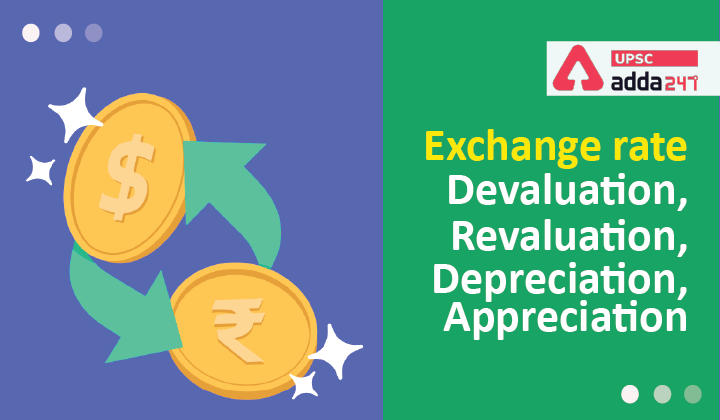Table of Contents
What is exchange rate?
- Exchange rate is a rate at which a currency of one country can be exchanged with a currency of other country. In other words, it is the value of the number of units of foreign currency a consumer can buy with one unit of their home currency.
- For example, if one U.S dollar exchanges for 75 Indian rupees, then the rate of exchange is 1$ = Rs. 75 or 1 Rs = 1/75 or 0.0133 U.S. dollar.
Get Free Study Material for UPSC and State PCS Examinations
Currency devaluation and revaluation
- Under a fixed exchange rate system, devaluation and revaluation are official changes in the value of a country’s currency relative to other currencies.
- Devaluation is when the price of the currency is officially decreased in a fixed exchange rate system.
- Revaluation is when the price of the currency is increased within a fixed exchange rate system.
- For example, suppose a government has set 10 units of its currency equal to one rupee. To devalue, it might announce that from now on 20 of its currency units will be equal to one rupee. This would make its currency half as expensive to Indian, and the Indian Rupee twice as expensive in the devaluing country.
- To revalue, the government might change the rate from 10 units to one rupee, to five units to one rupee. This would make the currency twice as expensive to Indians, and the rupee half as costly at home.
Reasons of currency devaluation
- Untenable fixed exchange rate system: To sustain a fixed exchange rate, a country must have sufficient foreign exchange reserves, often dollars, and be willing to spend them, to purchase all offers of its currency at the established exchange rate. When a country is unable or unwilling to do so, then it must devalue its currency to a level that it is able and willing to support with its foreign exchange reserves.
- Boost aggregate demand: Rather than implementing unpopular fiscal spending policies, a government might try to use devaluation to boost aggregate demand in the economy in an effort to fight unemployment.
Effects of devaluation
- Cheaper exports: Devaluation makes the country’s exports relatively less expensive for foreigners.
- Expensive imports: Devaluation makes foreign products relatively more expensive for domestic consumers, thus discouraging imports.
- Rise in inflation: For an import dependent country like India, Currency depreciation would mean increase in prices of imports, thus leading to inflation.
- Lower investor confidence: Devaluation may dampen investor confidence in the country’s economy and hurt the country’s ability to secure foreign investment.
Currency depreciation and appreciation
- Under a floating exchange rate system, market forces generate changes in the value of the currency, known as currency depreciation or appreciation.
Currency appreciation
- Currency appreciation refers to the increase in value of one currency relative to another in the forex markets.
Reasons of currency appreciation
- In a floating rate exchange system, the value of a currency constantly changes based on supply and demand in the forex market. This change allows traders and firms to increase or decrease their holdings and profit over them.
- Thus, a currency appreciates when the value of one goes up in comparison to the other.
- Appreciation is directly linked to demand. If the value appreciates (or goes up), demand for the currency also rises.
Effects of currency appreciation
- Export costs rise: If the Indian Rupee (INR) appreciates, foreigners will find Indian goods more expensive because they have to spend more for those goods in INR. That means that with the higher price, the number of Indian goods being exported will likely drop. This eventually leads to a reduction in gross domestic product (GDP).
- Cheaper imports: If Indian goods become more expensive on the foreign market; foreign goods, or imports, will become cheaper in India. The length to which 1 INR will stretch will go further, meaning one can buy more goods imported from abroad. That leads to a benefit of lower prices, leading to lower overall inflation.
Currency depreciation
- Currency depreciation is a fall in the value of a currency in a floating exchange rate system.
- Currency depreciation in one country can spread to other countries.
- Read about Rupee Depreciation in 2021.
Reasons of currency depreciation
- Economic fundamentals: Countries with weak economic fundamentals like burgeoning current account deficits and high rates of inflation can lead to currency depreciation.
- Interest rate differentials: Easy monetary policy and high rates of inflation are two of the leading cause of currency depreciation. When interest rates are low, investors, both domestic and foreign, will chase the highest yield. Expected interest rate differentials can also lead to currency depreciation. Central banks will increase interest rates to combat inflation as too much inflation can lead to currency depreciation.
- Political instability: In both, unstable policy regime and instable government, investors are suspicious about the market forces.
Effects of currency depreciation
- Improves export competitiveness: Currency depreciation, if orderly and gradual, improves a nation’s export competitiveness and may improve its trade deficit over time.
- May lead to pulling of foreign investment: An abrupt and sizable currency depreciation may scare foreign investors who fear the currency may fall further, leading them to pull portfolio investments out of the country.





 TSPSC Group 1 Question Paper 2024, Downl...
TSPSC Group 1 Question Paper 2024, Downl...
 TSPSC Group 1 Answer key 2024 Out, Downl...
TSPSC Group 1 Answer key 2024 Out, Downl...
 UPSC Prelims 2024 Question Paper, Downlo...
UPSC Prelims 2024 Question Paper, Downlo...




